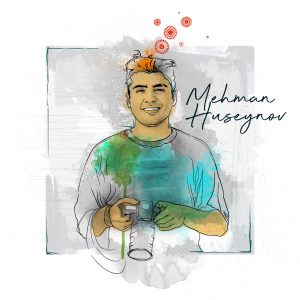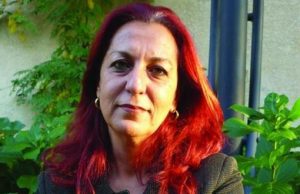27 Mar 2019 | Awards, News and features
[vc_row][vc_column][vc_video link=”https://youtu.be/d40JdCJTbw8″][vc_column_text]
Mehman Huseynov is a journalist and human rights defender who documents corruption and human rights violations in Azerbaijan, consistently ranked among the world’s worst countries for press freedom.
He was sentenced to two years in prison in March 2017 — after describing abuses he had suffered at a police station.
As independent journalist, vlogger, and editor-in-chief of the political magazine SANCAQ, Huseynov has put his life in danger to document largely sensitive issues. His work circulated widely on the internet, informing citizens about the real estate and business empires of the country’s government officials, and scrutinising the decisions of president Ilham Aliyev.
Huseynov was first arrested in 2012 for his role in the Sing for Democracy protests against the profligate spending on the 2012 Eurovision contest in Baku, and since then has been regularly interrogated by authorities, who imposed a travel ban on him and confiscated his documents – preventing access to services like health-care and education. In 2013, Huseynov was awarded one of the Fritt Ord Foundation’s and the ZEIT Foundation’s press prizes for his courageous journalism.
Azerbaijan is an authoritarian country in which power is heavily concentrated in the hands of president Ilham Aliyev, who has ruled the country since 2003. There is little room for independent expression or activism, and critical journalists, civil society leaders and human rights advocates face harassment, violence and detention.
On 9 January 2017 plain-clothes officers attacked Huseynov, blindfolded and gagged him with towels, forced a bag over his head and took him to the Nasimi district police station, where police used an electroshock weapon on his groin and punched him.
On 17 October 2018, Baku Court of Appeal dismissed his appeal against the denial of parole.
Before his release from prison in March 2019, Huseynov remained defiant, saying: “I am not here only for myself; I am here so that your children are not in my place tomorrow. If you uphold the judgement against me, you have no guarantees that you and your children will not be in my place tomorrow.”[/vc_column_text][vc_separator][vc_row_inner][vc_column_inner width=”1/2″][vc_single_image image=”104691″ img_size=”full” onclick=”custom_link” link=”https://www.indexoncensorship.org/2019/01/awards-2019/”][/vc_column_inner][vc_column_inner width=”1/2″][vc_column_text]
Index on Censorship’s Freedom of Expression Awards exist to celebrate individuals or groups who have had a significant impact fighting censorship anywhere in the world.[/vc_column_text][/vc_column_inner][/vc_row_inner][vc_separator][/vc_column][/vc_row][vc_row][vc_column][vc_basic_grid post_type=”post” max_items=”4″ element_width=”6″ grid_id=”vc_gid:1552914689259-de127fad-fb34-7″ taxonomies=”26925″][/vc_column][/vc_row]
26 Mar 2019 | Academic Freedom, News and features, Turkey
[vc_row][vc_column][vc_column_text]UPDATE: Prof. Zübeyde Füsun Üstel, whose 1 year and 3 months prison sentence was upheld on 25 February 2019, is due to begin her prison sentence within ten days, Frontline Defenders reported on 30 April 2019.[/vc_column_text][vc_column_text]

Zübeyde Füsun Üstel
A Turkish academic, who was given a 15-month jail sentence for signing a petition calling for peace in south-east Turkey, has had her sentence upheld and now faces prison. She is likely to be the first academic to be imprisoned for signing the petition.
Zübeyde Füsun Üstel’s 15-month jail sentence, originally imposed in April 2018 for signing a petition drafted by Academics for Peace, was upheld by the Turkish Court of Appeals on 25 February 2019. Üstel is a retired professor from Galatasaray University in Istanbul.
This decision by the appellate court means that she is in danger of being imprisoned very soon.
The peace petition — We Will Not Be a Party To This Crime — was initially signed by 1,128 academics and grew to 2,020 in the weeks after it was released in January 2016. Since then, the signatories have been subjected to a range of actions against them, including criminal and administrative investigations, detention, dismissals and revocation of their passports. As of December 2017, more than 400 academics have been dismissed and hundreds of PhD students have lost their scholarships.
Academics for Peace is an organisation of university professors and graduate students who drafted and launched the petition, which denounced the human rights violations committed by the government in the Kurdish regions of Turkey, demanded access to these areas for independent national and international observers, and called for a lasting peace to be secured.
“I think Professor Fusun Üstel’s case is a new illustration of the criminalisation of free speech in present-day Turkey,” said Noemi Levy-Aksu, an academic for peace whose case is still pending.
Üstel was the first academic to refuse the legal provision the courts offer when prison sentences are less than two years. The provision involves suspending the pronouncement of judgment for a period of five years, during which the defendant is supposed to refrain from committing further “crimes”. Since what constitutes a crime in Turkey can be arbitrarily changed or determined by the political establishment, this provision aims to discipline defendants by placing them under supervision by the government. However, the advantage to the provision is that the suspect is left with no criminal record, barring their good behavior.
In her court hearing in April 2018, Üstel refused the offer of a suspension and was consequently sentenced to 15 months in prison. She appealed, but it was rejected on 25 February. She could become the first academic to be imprisoned since the trials began in December 2017. Nine other academics have refused the suspension provision and are waiting to appear before the court of appeals, according to the Academics for Peace website.
Following the confirmation of Üstel’s sentence, new initiatives have been started to raise awareness about her and all of the other Academics for Peace cases.
“An open letter has been endorsed by Academics for Peace-US and UK, academic and human rights organisations and more than 1500 academics from all around the world. Other initiatives are ongoing, especially in Germany, France, the US and the UK, where many academics from Turkey are now based,” said Levy-Aksu.
Investigations were opened by the government individually against each petition signatory on charges of “conducting propaganda for a terrorist organisation.” This is the charge professor Üstel is currently facing, as per the Article No. 7/2 of the Anti-Terror Law No. 3713.
Some judges, including one dissenting judge in Üstel’s appeal case, believe the academics should not be tried under the anti-terror law on the charge of propagandizing for a terrorist organisation. Instead, they argue that Üstel’s and other cases should be considered as per the Article 301 of the Turkish penal code on the charge of “degrading the state of the republic of Turkey”.
“From the beginning, the trial of the Academics for Peace relied on very shaky grounds, both in terms of procedure and substance. The inconsistency of the decisions taken by the different courts show the arbitrariness of the process. Verdicts have been erratic and varied from 15 to 36 months imprisonment,” said Levy-Aksu.
Almost 600 of the signatories are currently undergoing trials on grounds of engagement in “propaganda for a terrorist organisation.”
Üstel published a series of articles in Turkey-based and international journals of social sciences. Her articles have mostly focused on the history of Turkey, nationalism and issues of identity.
Since its founding in 2012, Academics for Peace has organised different actions to highlight attacks on the Kurds in south-east Turkey, and to call for the Turkish government to change its policy towards the Kurds. In 2012 it issued a statement showing support for Kurdish prisoners’ demands for peace in Turkey. This statement was signed by 264 academics from over 50 universities.
Since January 2016 when they published the peace petition, the Academics for Peace case has remained a symbol of the ongoing crackdown on the right to protest and speak out against the government in Turkey.
“In the current circumstances this will highly depend on governmental policy. The other venue to challenge the decision is the European Court of Human Rights, before which several applications have already been brought,” said Levy-Aksu.[/vc_column_text][/vc_column][/vc_row][vc_row][vc_column][vc_basic_grid post_type=”post” max_items=”12″ style=”load-more” element_width=”6″ grid_id=”vc_gid:1556799978592-db3cfbd5-6c56-0″ taxonomies=”7355, 8607″][/vc_column][/vc_row]
26 Mar 2019 | China, India, Magazine, News and features, South Africa, United Kingdom, Volume 48.01 Spring 2019, Volume 48.01 Spring 2019 Extras, Zimbabwe
Is this all the local news? We discuss this in the latest podcast. In the spring 2019 edition of Index on Censorship magazine, we explore what happens when the local news media is not there to hold power to account. Guests on this edition of the podcast are all featured in the latest magazine. Beijing-based reporter Karoline Kan, who writes for this issue, explores whether China’s social credit system could impact local journalism; Ian Murray, director of the Society of Editors, discusses a new survey where local editors talk about their fears for the future; co-founder of the Bishop’s Stortford Independent Sinead Corr talks about how she recently launched a new and successful local paper; plus in a special segment current Index youth board members Arpitha Desai, hailing from India, and Melissa Zisengwe, originally from Zimbabwe but now living in South Africa, talk about the strengths and weaknesses of community news in their countries.
Print copies of the magazine are available on Amazon, or you can take out a digital subscription via Exact Editions. Copies are also available at the BFI, the Serpetine Gallery and MagCulture (all London), News from Nowhere (Liverpool). Red Lion Books (Colchester) and Home (Manchester). Each magazine sale helps Index on Censorship continue its fight for free expression worldwide.
The Spring 2019 podcast can also be found on iTunes.


